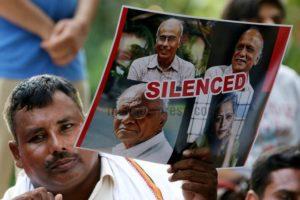Adani, Jay Amit Shah & the Ruling Ideas of the Ruling Class

George Orwell’s 1984 echoes with the slogan – Who controls the past controls the future. Who controls the present controls the past. The State, Orwell wrote, attempts to manage ‘knowledge,’ to produce discourses that change according to its own interests and its agendas. The State attempts to ‘manufacture’ knowledge to achieve its ends, using all the power of its institutions to drive its project.
The class that controls the State defines what is ‘correct’ in its time. As Marx and Engels wrote, ‘The ruling ideas of each age have ever been the ideas of its ruling class.’
So it is in India.
On July 18th, the editor of Economic and Political Weekly (EPW), Paranjoy Guha Thakurta resigned his post. Guha Thakurta is a well-known investigative journalist who has built a career exposing the work of corporations. This time, Guha Thakurta ran afoul of one of India’s most powerful corporate entities – the Adani Group. He had co-authored an article that alleged that the Central government tweaked the rules related to the special economic zones to extend favors to the Adani Group. This tweaking of the rules by the government helped the Adani Group to make a bonanza of Rs 500-Crore. Paranjoy Guha Thakurta based his article on a document and two anonymous sources who leaked an investigative report by a government agency. The government denied the existence of any such investigation report. The Adani Group sent a letter to the publishers and the authors of the article. It was seen by the Trustees as a legal notice and a threat. They asked Guha Thakurta to remove the articles. He refused. When they insisted, he resigned [there is some controversy about what happened in these meetings].
It was clear that the strong and a powerful corporate group, backed by the friends in the establishment, decided to pressure the author and the publisher with its letter, which led to the removal of the article by the publisher from its website. The article by Paranjoy Guha Thakurta exposed the nexus between corporates and the State, two of the most influential institutions in the country. While the whole controversy was on, the silence of the State wasn’t surprising.

On October 9th, the website The Wire and its journalist Rohini Singh published an exposé on the financial deals of Jay Amit Shah, the son of BJP leader Amit Shah. Rohini Singh looked at public documents to show how Jay Amit Shah’s company went from a net loss to making an enormous profit – just after his father’s party came to power with his father’s close friend as the new Prime Minister. The Establishment – namely the government led by Narendra Modi and the BJP – responded by defending the ‘private citizen,’ in this case Jay Amit Shah. When Rohini Singh had exposed shady deals by the Congress Party President’s son in law, the BJP celebrated. This time they were upset. Their protest came in the way of threats of lawsuits and eventually of a criminal defamation suit against the journalist and the publication.
The legal notices sent by both the Adani Group and Jay Amit Shah added to the continuous occurrences of SLAPPs (strategic lawsuit against public participation). The SLAPP is how people in power get back to the journalists and writers if they write against them. Such notices are sent to demoralize the people by making them go through the rigorous judicial process. As a result, the writers suffer both mentally and financially. In India, different corporate houses have sued various publications and journalists in the recent years. The pressure from the publishers who ultimately decided to bow down in front of a legal notice can lead to the removal of the article.
In the past few months, there have been multiple instances of books getting banned, threats of violence and police cases against writers because their content was found objectionable by those in power. Writer Hansda Shekhar’s book, The Adivasi will not dance, was banned by the Jharkhand government. The government claimed the book was pornographic in its content and showed the community in a bad light. In the second instance, a book on Yoga Guru Baba Ramdev’s life was banned by a local court in Delhi after Ramdev’s lawyers objected to the book in the court. The people who didn’t like the books used two different institutions to get them banned (the state and the judiciary).
In another case, Professor Kancha Ilaiah has been facing threats of violence and calls for his public hanging by politicians for a chapter from his 2009 book, Post-Hindu India. The ‘Vysyas’ community in Telangana found this chapter offensive. These threats forced Kancha Ilaiah to go into a self-imposed house arrest. The government, ironically, didn’t provide security to Kancha Ilaiah. Instead, it promised that the book would be blocked from getting sold in the state. World Arya Vysya Mahasabha, an organization which claims to represent Vyasyas community filed a petition in the court seeking a criminal complaint against Kancha Ilaiah. In the latest news, a police case has been registered against Kancha Ilaiah for his remarks in the book.These instances reflect the hopeless situation writers find themselves in when the system decides to act against the knowledge they produce. The State indulges in both the direct and indirect intimidation of the writers.

In the current era of social media, fake news has become a tool for the character assassination of the journalists and intellectuals who write against the policies of the government. Prime Minister Narendra Modi, with his silence on the attacks on journalists and by following abusive profiles on social media, has been promoting this troll army which takes on journalists even before the state comes into the picture. The people who lead these armies in the online world are from the establishment and thus, can be viewed as a branch of the State.
All these cases have something in common. If the State does not like someone’s production of knowledge, then the State and its emissaries act against the person. The hegemony of the ruling class – and its instrument in power – attempts to create and control discourses that are of importance, such as their corruption and their role in the reproduction of poverty. They will suppress the truth to the point of making it extinct if it gives them an advantage. These are our times.
Disclaimer: The views expressed here are the author's personal views, and do not necessarily represent the views of Newsclick.
Get the latest reports & analysis with people's perspective on Protests, movements & deep analytical videos, discussions of the current affairs in your Telegram app. Subscribe to NewsClick's Telegram channel & get Real-Time updates on stories, as they get published on our website.























